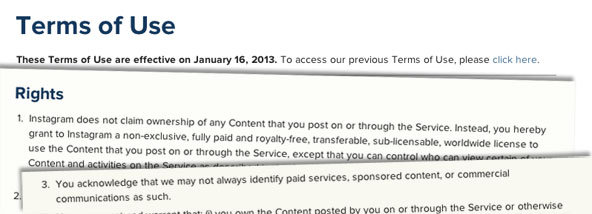Class Action Lawsuit Questions Instagram's New Terms of Service

Just days after the release of Instagram's new Terms of Service, the photo-sharing mobile app has been hit with a class action lawsuit questioning the legality of the new terms. After its acquisition by Facebook, Instagram hinted at the incorporation of ads in the growth of the platform.
In line with these predictions, the new terms of use outlined conditions on which user photos can be used by the company. The new terms read:
To help us deliver interesting paid or sponsored content or promotions, you agree that a business or other entity may pay us to display your username, likeness, photos (along with any associated metadata), and/or actions you take, in connection with paid or sponsored content or promotions, without any compensation to you.
Concerned users protested these terms of service by deleting their accounts, starting petitions, and spreading concern over social media accounts. The National Geographic resisted by posting an image that read:
"@NatGeo is suspending new posts to Instagram. We are very concerned with the direction of the proposed new terms of service and if they remain as presented we may close our account."
In a blog post titled "Thank you and we're listening," CEO Kevin Systrom retracted the new terms, vowing to remove language that would enable photos to be used in advertisements unbeknownst to users.
Upon this retraction, the National Geographic returned to the platform, declaring "We're back," while others expressed their gratitude for Systrom's quick response to concern.
Some users, however, remain wary of the service. While Systrom wasted no time in clarifying the language about advertising, the mandatory arbitration clause adopted in the new terms of service remains untouched.
The arbitration clause mandates that upon use of the service, users agree that disputes will be resolved by individual arbitration as opposed to class action lawsuit.
Prior to these terms taking affect, a civil lawsuit has been filed in the U.S. District Court, Northern District of California, by California Instagram user Lucy Funes, who is acting individually and on behalf of “others similarly situated.”
The lawsuit's main accusation is a breach of contract, criticizing Instagram for giving no protection to those who decide to opt-out come January 2013.
As articulated in the Terms of Use, users who do not agree with Instagram's new guidelines can opt-out by deactivating their accounts. It does not provide any protection for previous posts and images.
"In short, Instagram declares that ‘possession is nine-tenths of the law and if you don't like it, you can't stop us,’” the lawsuit states.
Since photos are in the possession of the company, the lawsuit argues that property rights are in jeopardy, risking exploitation of user-generated content for advertising purposes.
Without introducing advertisements, however, how would the photo-sharing app make a profit? The Atlantic's Alexis C. Madrigal argues that by not charging for the services, Instagram is entitled to your photos.
"Truly, the only way to get around the privacy problems inherent in advertising-supported social networks is to pay for services that we value. It's amazing what power we gain in becoming paying customers instead of the product being sold."
The characterization of Instagram users transforming from the "product" into a paying customers, fully equipped with rights to privacy, brings to light the legal rights associated with a free service.
What exactly can we expect from a free service? Are users entitled to certain rights when using mobile services, or is this sense of self-entitlement for privacy protections unwarranted on a free service like Instagram?





